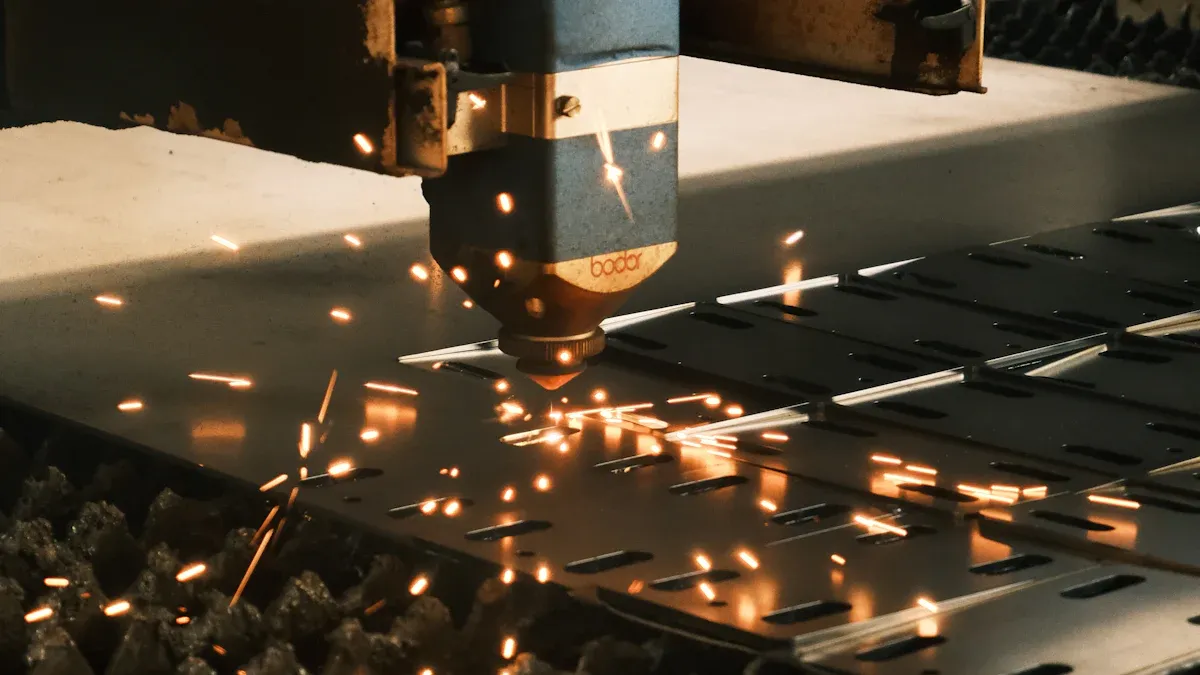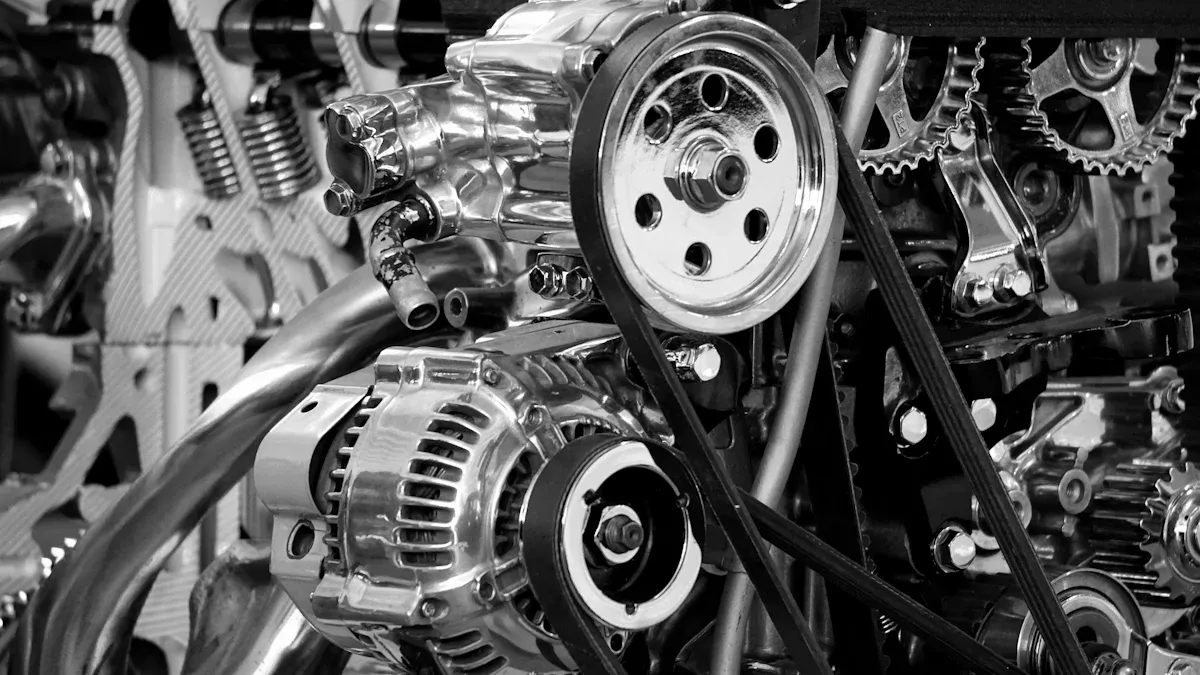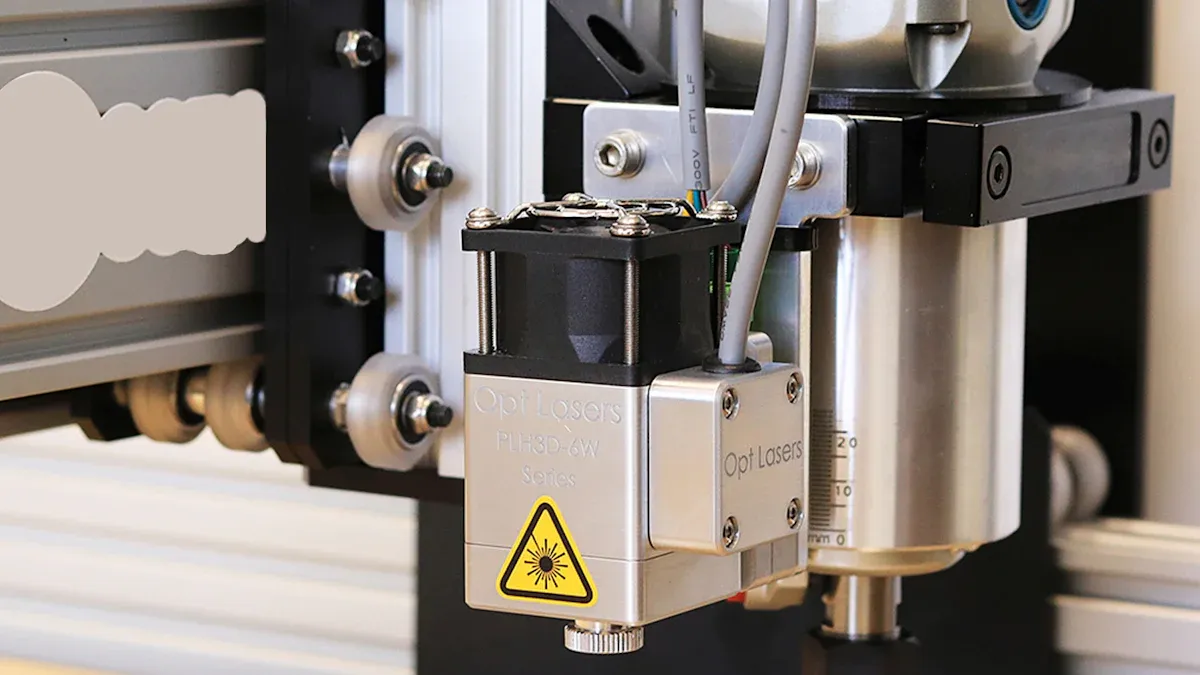What industries benefit the most from die casting CNC machining spare parts?

Industries like automotive, aerospace, electronics, medical, defense, renewable energy, and agriculture rely heavily on casting CNC machining spare parts. These components bring unmatched precision and durability to critical applications. You can see their impact in everything from lightweight automotive parts to advanced medical devices. CNC machining spare parts also reduce costs by improving manufacturing efficiency and minimizing waste. Their versatility allows you to achieve high-quality results across a wide range of sectors, ensuring reliability and long-term performance.
Key Takeaways
- CNC machining parts improve accuracy and strength in important uses. Industries like cars, planes, and healthcare rely on them.
- Using lighter materials in car parts saves fuel and helps the environment. This is good for people and the Earth.
- In airplanes, CNC machining makes sure parts are safe and work well. This is very important for passenger safety.
- CNC machining helps make better electronic parts. It allows devices to be smaller and work faster.
- Buying CNC-made parts for farm machines boosts work and lowers repair costs. This makes farming easier and more effective.
Automotive Industry and CNC Machining Spare Parts

Engine and Transmission Components
You rely on your vehicle’s engine and transmission to perform seamlessly every day. CNC machining spare parts play a critical role in ensuring these components meet the highest standards of precision and durability. For example, cylinder heads, pistons, and crankcases require exact measurements to function efficiently. CNC machining delivers this level of accuracy, reducing the risk of mechanical failure.
Additionally, die casting allows manufacturers to produce complex shapes that are both lightweight and strong. This combination improves fuel efficiency and extends the lifespan of your vehicle. By using CNC machining spare parts, automakers can also reduce production costs while maintaining consistent quality.
Lightweight Parts for Fuel Efficiency
Fuel efficiency has become a top priority in the automotive industry. You may have noticed that modern vehicles feel lighter yet more robust. This is because manufacturers use lightweight materials like aluminum and magnesium alloys, which are ideal for die casting. CNC machining ensures these materials are shaped with precision, creating parts that reduce the overall weight of your car.
Lighter vehicles consume less fuel, which saves you money and reduces environmental impact. For instance, lightweight chassis components and suspension systems improve aerodynamics and handling. CNC machining spare parts make it possible to achieve these benefits without compromising safety or performance.
Tip: Choosing vehicles with lightweight components can help you save on fuel costs over time while contributing to a greener planet.
Electric Vehicle Manufacturing
Electric vehicles (EVs) represent the future of transportation. If you drive an EV, you benefit from advanced technologies that rely heavily on CNC machining spare parts. These parts are essential for producing battery housings, motor components, and cooling systems. Precision is crucial in EV manufacturing to ensure optimal performance and safety.
Die casting combined with CNC machining allows manufacturers to create intricate designs that maximize energy efficiency. For example, thermal management systems in EVs require components with excellent heat dissipation properties. CNC machining ensures these parts meet exact specifications, enhancing the reliability of your vehicle.
As EV adoption grows, the demand for high-quality CNC machining spare parts will continue to rise. This technology supports innovation in the automotive industry, paving the way for more sustainable and efficient transportation solutions.
Aerospace Industry and CNC Machining Spare Parts

Aircraft Structural and Engine Components
When you think about airplanes, their structural and engine components are some of the most critical parts. These components must withstand extreme conditions, such as high altitudes, intense pressure, and rapid temperature changes. CNC machining spare parts play a vital role in manufacturing these parts with unmatched precision.
For example, turbine blades, engine casings, and wing components require intricate designs to ensure optimal performance. CNC machining allows manufacturers to create these complex shapes with tight tolerances. This ensures that every part fits perfectly and functions as intended.
Did you know? Aircraft engines often contain hundreds of CNC-machined parts, each designed to meet strict safety and performance standards.
Precision and Weight Reduction
In the aerospace industry, precision and weight reduction are two key priorities. Every ounce matters when it comes to designing aircraft. Lighter planes consume less fuel, which reduces costs and environmental impact. CNC machining spare parts help achieve this by enabling the use of lightweight materials like aluminum and titanium alloys.
You might wonder how precision contributes to weight reduction. By machining parts with exact dimensions, manufacturers can eliminate unnecessary material without compromising strength. This results in lighter components that still meet the rigorous demands of aerospace applications.
Additionally, CNC machining ensures consistency across all parts. Whether it’s a single prototype or a large production run, you can trust that each part will meet the same high standards.
Meeting Safety and Quality Standards
Safety is non-negotiable in the aerospace industry. Every component must meet strict quality standards to ensure the safety of passengers and crew. CNC machining spare parts are essential for achieving this level of reliability.
The precision offered by CNC machining minimizes the risk of defects, which could lead to mechanical failures. Manufacturers also use advanced inspection techniques to verify that each part meets the required specifications. This attention to detail ensures that the final product is both safe and efficient.
Tip: Next time you board a plane, remember that CNC machining plays a crucial role in keeping you safe during your journey.
Electronics Industry and CNC Machining Spare Parts
Heat Sinks, Enclosures, and Connectors
In the electronics industry, you often encounter devices that generate heat during operation. Heat sinks, enclosures, and connectors are essential components that help manage this heat and protect sensitive electronics. CNC machining spare parts play a crucial role in manufacturing these components with high precision.
For example, heat sinks require intricate designs to maximize surface area for better heat dissipation. CNC machining ensures these designs are accurate, improving the performance and lifespan of your devices. Similarly, enclosures and connectors must fit perfectly to shield components from dust, moisture, and electrical interference.
Tip: Properly designed heat sinks and enclosures can significantly extend the life of your electronic devices.
Thermal Conductivity and Miniaturization
Modern electronics demand smaller, more efficient components. You’ve likely noticed how smartphones and laptops have become thinner and more powerful over time. This trend is possible because of advancements in thermal conductivity and miniaturization.
CNC machining spare parts enable manufacturers to work with materials like aluminum and copper, which have excellent thermal properties. These materials help dissipate heat effectively, even in compact designs. CNC machining also allows for the creation of tiny, intricate parts that fit into the smallest spaces without compromising performance.
By using CNC machining, manufacturers can meet the growing demand for compact, high-performance electronics.
Applications in Consumer and Industrial Electronics
You interact with CNC-machined parts daily, whether you realize it or not. From smartphones and gaming consoles to industrial control systems, these parts are everywhere. CNC machining spare parts are vital for creating components like circuit boards, connectors, and housings.
In consumer electronics, precision ensures that devices function smoothly and last longer. In industrial settings, durability becomes even more critical. CNC machining delivers parts that can withstand harsh conditions, ensuring reliability in demanding environments.
Did you know? CNC machining is also used to produce prototypes for new electronic devices, speeding up the innovation process.
Medical Industry and CNC Machining Spare Parts
Surgical Instruments and Device Components
In the medical field, precision is critical. Surgical instruments and device components must meet exact specifications to ensure patient safety and effective treatment. CNC machining spare parts play a vital role in manufacturing tools like scalpels, forceps, and clamps. These instruments require smooth finishes and precise dimensions to perform delicate procedures.
You also see CNC machining used in creating components for medical devices such as ventilators and infusion pumps. These parts must fit perfectly to ensure the devices function reliably. By using CNC machining, manufacturers can produce high-quality parts that meet the strict standards of the medical industry.
Biocompatibility and Precision
Medical implants and devices must be biocompatible to avoid adverse reactions in the human body. CNC machining allows manufacturers to work with materials like titanium and stainless steel, which are both durable and biocompatible. This ensures that implants, such as joint replacements and dental crowns, integrate well with the body.
Precision is equally important. For example, orthopedic implants must align perfectly with the patient’s anatomy. CNC machining ensures these parts are crafted with the highest accuracy, reducing the risk of complications. You benefit from safer, more effective medical treatments thanks to this technology.
Imaging Equipment and Prosthetics
Advanced imaging equipment, such as MRI and CT scanners, relies on CNC-machined components for optimal performance. These machines require parts with tight tolerances to produce clear, accurate images. CNC machining ensures these components meet the necessary standards, improving diagnostic accuracy.
Prosthetics also benefit from CNC machining. Custom prosthetic limbs require precise measurements to ensure a comfortable fit. CNC machining allows manufacturers to create lightweight, durable parts tailored to individual needs. This technology enhances mobility and quality of life for patients.
Note: CNC machining spare parts contribute to life-saving innovations in the medical industry, from surgical tools to advanced imaging systems.
Defense Industry and CNC Machining Spare Parts
Weapon Systems and Military Vehicles
In the defense industry, precision and reliability are critical. You depend on weapon systems and military vehicles to perform flawlessly in high-stakes situations. CNC machining spare parts play a vital role in manufacturing components for tanks, aircraft, and naval vessels. These parts ensure that weapons like missile launchers and firearms operate with pinpoint accuracy.
Military vehicles also benefit from CNC machining. Components such as engine parts, suspension systems, and armor plating require exact specifications to handle the demands of combat. By using CNC machining, manufacturers can produce durable and efficient parts that enhance the performance of these vehicles.
Durability in Harsh Environments
Defense equipment often operates in extreme conditions. Whether it’s scorching deserts, freezing tundras, or saltwater environments, you need parts that can withstand these challenges. CNC machining allows manufacturers to use materials like titanium and stainless steel, which resist corrosion and wear.
For example, naval ships require components that endure constant exposure to saltwater. Similarly, aircraft parts must handle rapid temperature changes and high altitudes. CNC machining ensures these parts maintain their integrity, even in the harshest environments. This durability reduces the risk of equipment failure, keeping operations running smoothly.
Note: Durable components not only improve performance but also reduce maintenance costs over time.
Advanced Defense Technologies
Modern defense systems rely on cutting-edge technology. From drones to advanced radar systems, you see CNC machining spare parts at the heart of these innovations. These parts enable the production of lightweight, high-performance components that support advanced capabilities.
For instance, unmanned aerial vehicles (UAVs) require precision-engineered parts to achieve stability and efficiency. CNC machining ensures these parts meet the exacting standards needed for such applications. Additionally, radar and communication systems depend on CNC-machined components for seamless operation.
By leveraging CNC machining, the defense industry continues to push the boundaries of innovation, ensuring you stay ahead in a rapidly evolving world.
Renewable Energy Industry and CNC Machining Spare Parts
Wind Turbine and Solar Panel Components
Renewable energy systems rely on precision-engineered components to function efficiently. You see this in wind turbines and solar panels, where every part must perform flawlessly. CNC machining spare parts play a key role in manufacturing critical components like turbine blades, gearboxes, and solar panel frames. These parts require exact dimensions to ensure smooth operation and maximum energy output.
For example, wind turbine blades must be lightweight yet strong enough to withstand high winds. CNC machining ensures these blades meet strict specifications, improving their durability and performance. Similarly, solar panel frames need to be corrosion-resistant and precisely aligned to capture sunlight effectively. By using CNC machining, manufacturers can produce parts that enhance the efficiency of renewable energy systems.
Did you know? A single wind turbine can contain hundreds of CNC-machined parts, all working together to generate clean energy.
Corrosion Resistance and Strength
Renewable energy equipment often operates in harsh environments. Wind turbines face constant exposure to rain, salt, and wind, while solar panels endure intense sunlight and temperature fluctuations. You need parts that can resist corrosion and maintain their strength over time.
CNC machining allows manufacturers to use materials like stainless steel and aluminum alloys, which offer excellent corrosion resistance. These materials ensure that components last longer, reducing maintenance costs and downtime. For instance, turbine housings and solar panel mounts benefit from this durability, keeping your renewable energy systems running smoothly.
Energy Storage Systems
Energy storage is a vital part of renewable energy. Batteries and other storage systems help store excess energy for later use. CNC machining spare parts are essential for creating components like battery casings, connectors, and cooling systems.
Precision is critical in energy storage systems. Battery casings must fit perfectly to prevent leaks and ensure safety. CNC machining delivers the accuracy needed to meet these requirements. Additionally, cooling systems rely on CNC-machined parts to manage heat effectively, extending the lifespan of your batteries.
By supporting energy storage innovations, CNC machining helps make renewable energy more reliable and accessible for everyone.
Agriculture Industry and CNC Machining Spare Parts
Machinery and Equipment Parts
Agricultural machinery plays a vital role in modern farming. You rely on equipment like tractors, harvesters, and irrigation systems to complete tasks efficiently. CNC machining spare parts are essential for manufacturing critical components in this machinery. For example, engine parts, hydraulic systems, and gearboxes require precise engineering to function properly.
CNC machining ensures that these parts meet exact specifications, reducing the risk of breakdowns during operation. This precision also allows manufacturers to create complex designs, improving the performance of your equipment. Whether you’re planting crops or harvesting them, CNC-machined parts help your machinery work reliably under demanding conditions.
Wear Resistance and Cost-Effectiveness
Farming equipment often operates in harsh environments. Soil, moisture, and debris can cause significant wear and tear on machinery. You need parts that can withstand these challenges without frequent replacements. CNC machining allows manufacturers to use durable materials like hardened steel and aluminum alloys, which resist wear and corrosion.
By investing in CNC-machined parts, you can reduce maintenance costs over time. These parts last longer, minimizing the need for repairs and replacements. This cost-effectiveness benefits both small-scale farmers and large agricultural operations.
Tip: Regular maintenance of your equipment, combined with high-quality CNC-machined parts, can extend its lifespan and save you money.
Enhancing Productivity and Efficiency
In agriculture, time is critical. Delays in planting or harvesting can impact your yield. CNC machining spare parts contribute to the efficiency of your machinery, ensuring it operates at peak performance. For instance, precision-engineered components in seeders and sprayers improve accuracy, reducing waste and maximizing productivity.
You also benefit from faster turnaround times when replacing parts. CNC machining enables manufacturers to produce spare parts quickly, keeping your equipment running with minimal downtime. This reliability helps you focus on what matters most—growing and harvesting crops efficiently.
Did you know? CNC machining technology supports innovation in agriculture, paving the way for smarter, more efficient farming practices.
Die casting CNC machining spare parts have transformed industries like automotive, aerospace, electronics, medical, defense, renewable energy, and agriculture. You see their impact in the precision of medical devices, the durability of defense equipment, and the efficiency of renewable energy systems. This technology combines accuracy, versatility, and cost-effectiveness, making it a cornerstone of modern manufacturing. By enabling innovation and improving productivity, it continues to shape the future of diverse sectors.
FAQ
What is die casting CNC machining?
Die casting CNC machining combines die casting, which molds metal into shapes, with CNC machining, which refines these shapes for precision. This process creates durable, accurate parts for industries like automotive and aerospace.
Why is CNC machining important for precision?
CNC machining uses computer-controlled tools to achieve exact measurements. This ensures parts fit perfectly and function reliably, reducing errors and improving performance in critical applications.
Which materials work best for CNC machining spare parts?
Materials like aluminum, titanium, and stainless steel are ideal. They offer strength, corrosion resistance, and lightweight properties, making them suitable for industries such as aerospace, medical, and renewable energy.
How does CNC machining support sustainability?
CNC machining minimizes material waste by using precise cutting techniques. It also enables the production of lightweight components, which improve energy efficiency in vehicles, aircraft, and renewable energy systems.
Can CNC machining handle complex designs?
Yes, CNC machining excels at creating intricate and complex designs. It allows manufacturers to produce parts with tight tolerances, ensuring high-quality results for advanced technologies like electric vehicles and medical devices.